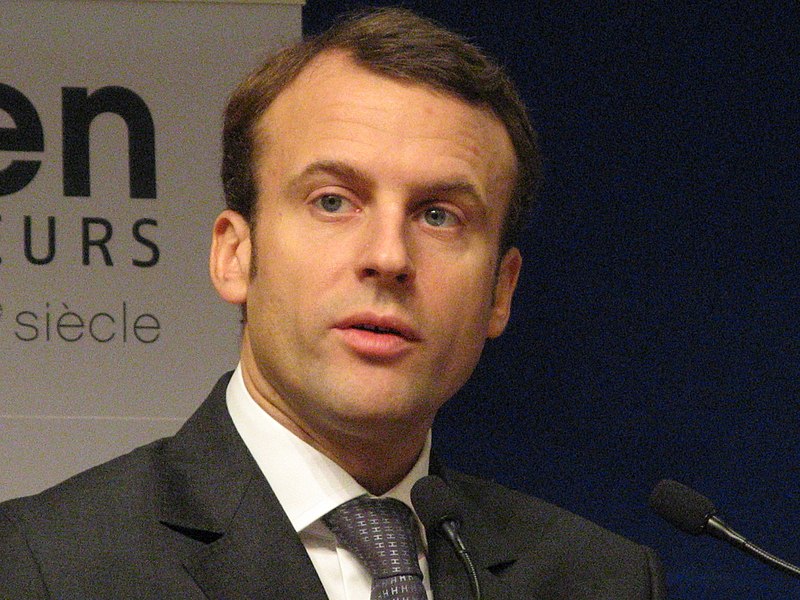Jorge Moruno is a sociologist of Work, and former head of discourse for the Podemos movement, of which he was a founding member. In his last book, La fábrica del emprendedor (The Factory of the Entrepreneur), Jorge Moruno analysed the central place of the entrepreneur figure in our society and criticised the ‘Totalitarianism of the Company-world’. In the first part of this interview, which took place in Madrid, we asked him about this entrepreneur figure, our changing relation to work, the Basic Income, the whereabouts of the neoliberal hegemony and the rising of a ‘neoliberal populism’ with Emmanuel Macron as one of its main figures.
This interview was conducted by our French partner LVSL. Translted into English by Augustin Choukair and Amy Westwell.
LVSL: You are the author of La fábrica del emprendedor (The Factory of the Entrepreneur). What makes you think that the entrepreneur figure has become central in our society?
The entrepreneur figure has been playing a major role in the public sphere since the 2008 economic crisis revealed the difficulty of socially integrating the population through the waged work mechanism. As it is now harder to provide a sufficient and uninterrupted workload for most of the population, we witness the rise of an injunction to entrepreneurship associated with the belief that you should “follow your dream, conquer success. Because when you want, you can.”
This is a way to avoid drawing attention to the structural economic problems our Western societies face following the crisis of post-war social compromise. In my opinion, this is a real regime crisis that strikes a society which relies on the principle of employment as the basis of access to citizenship, social rights, consumption etc. All of this is on the brink of falling apart.
“The neoliberal cultural model’s success is its ability to change and adapt aspirations that are not inherently bad – such as autonomy, initiative, cooperation, collaborative economy – into forms that track its preferred way of thinking.”
The crisis in the balance of coexistence started in the 1970s. From that period until today, the neoliberal counter-revolution led to the rush forward of a capitalism based on credit. The 1970s saw the beginning of financialisation, with the entrepreneur figure as the main cultural icon of the triumphing finance era. Having dreams and wanting to innovate are not bad things in themselves. But one of the neoliberal cultural model’s biggest successes is its ability to change and adapt aspirations that are not inherently bad – such as autonomy, initiative, cooperation, collaborative economy – into forms that track its preferred way of thinking.
It follows that the best way to face this entrepreneurial discourse is not to reject the aspirations it targets, but to understand these aspirations and to adapt them differently, according to another way of thinking. We should not try to revive a past imagination, but rather adapt it to the 21st century, in a new context where job stability will not secure citizenship anymore. It never will again. I am not the one to assert it, it is the International Labour Organization, recognizing that stable and lasting jobs are going to be less and less a norm in Western societies. The same goes for the European Trade Union Confederation, according to which waged work does not guarantee the ability to live in dignity. The question we have to consider is this: how can we imagine a form of citizenship that is not based on job stability?

LVSL: Your analysis is somewhat close to the one Luc Boltanski and Eve Chiapello developed in their book The New Spirit of Capitalism, particularly when you insist on neoliberal capitalism’s ability to absorb critics and incorporate aspirations of the individual like autonomy and personal development. Can the hegemony of neoliberalism be accounted for by its ability to make itself desirable?
Yes, taking from André Gorz and the critics of new capitalism, I think the cultural question is central. We can think about culture as having been fused with the logic of production, it became a commodity: today, no field is free from the capitalist social relation. Neoliberal capitalism is therefore constructed as a utopia, a ‘living thought’ as Hayek used to say. And this utopia is based on a kind of communist spirit. I am not referring here to states of ‘real socialism’ but to the idea of emancipation from material life conditions.
All the rhetoric about motivation, that we find in Emmanuel Macron’s speeches as well as in advertisements, can be summarized like this: ‘emancipate yourself from your assigned position, emancipate yourself from your condition as a worker’. To some extent, this is what Marxist theory says! I think the element that makes the situation seem acceptable, even in the current era of structural crisis, is the idea of ‘living better and suffering less’. Margaret Thatcher adapted this idea in her own way, talking about ‘popular capitalism’. This discourse did not target the elites but rather the people: access to ownership was pushed as a way to give power back to the people.
I think in the current stage of capitalism, the neoliberal utopia is centred around the idea that ‘the solution is within you’. And here we face a paradox: while neoliberalism calls for the emancipation of the employee from their condition as a worker, those standing against capitalism ask for the right of employees to get their rightful place in capitalism. It is a reverse May 1968, in a way.
LVSL: If neoliberal capitalism manages so well to absorb and digest contradiction, what model can we propose today?
We have to ask ourselves this question: How will we be able to build a utopia which would not be defensive but would directly respond to the 21st century’s structural conditions, a utopia that would take action and agree to tackle new issues? Among other things, we have to imagine new criteria for wealth and citizenship which would not be measured by invested time. Because today there is much more wealth than paid work. We can come up with another way to think about wealth that would, for example, consider household chores, time used for taking care of our children, our elders, all those activities not being considered today as relating to wealth.
“Against the Me-neoliberal, the Me-business, we have to imagine emancipation collectively, with ‘we can’ rather than ‘I can’.”
Every imagination centred on demanding full employment is bound to fail and can only strengthen Macron’s discourse about the solution being within the individuals. This discourse targets the outcasts of the stable job market, who are told that they will not find a lasting job in the future, a future they can weather only by building it themselves, by becoming an entrepreneur. Against the Me-neoliberal, the Me-business, we have to imagine emancipation collectively, with ‘we can’ rather than ‘I can’.
André Gorz explains that very well. We over-naturalized the modern concept of work, considering it as the only historically valid way to understand human activity. The ideology of work is very strong, well-established since the 18th century. It is very difficult – and this is the battle we have to fight to conceive an imagination adapted to the 21st century – to find another way to consider work, beyond its current form under capitalist social relations. This is not about demanding idleness, but about demanding another way to conceive coexistence.
We have to build a conception of wealth not based on exchange value. Traditional Marxism always considered value to be a good thing, arguing that we had to demand rights for workers based on their condition as productive entities, who produced value. Obviously this is their condition, but they are productive in the capital logic. What we have to build is another logic, with criteria not set by capitalist standards.
What is the problem today? It seems capitalism itself is starting to abolish work, therefore abolishing itself, as there is no capitalism without human work. This is the big contradiction highlighted by Marx: to continue growing, capitalism has to put an end to the foundation of its own growth, a material and social wealth that was always harder to channel through value. This can make it explode.
Human activity must not be measured by the criteria of capital. Part of the traditional labour movement has been in this way functional to the development of capitalism. It is not necessarily a bad thing, since it conquered social rights inside of this relation to the capital. But the class struggle is becoming a commercial rights struggle: if labour power is a commodity, why not try to sell it as expensive as possible on the market? In that way, we are still in a relation between capital’s categories. We have to ask ourselves how we can be emancipated from the influence of value, in a context where ‘human merchandise’ is harder and harder to sell in the job market.
LVSL: The value of work is a central element of our societies. The unemployed are constantly stigmatized, those receiving benefits are regularly referred to as ‘assisted’ and ‘lazy’. Therefore, how can we create a political strategy which concerns itself with emancipation from the work value? During the French presidential election, Benoit Hamon’s basic income did not raise enthusiasm. The left candidate who got most votes, Jean-Luc Mélenchon, fought more for restarting activity and creating jobs, dignified work conditions for the employees and integral social security – the very ideas you urge against making a central tenet of an emancipatory programme.
It would be wrong to sacralise one idea, like basic income. It is being debated even in IMF, OECD and Silicon Valley. There are ultraliberal theories of basic income. This is why the context has to be defined beforehand, as well as the general political orientation the measure is conceived in. If basic income is solely conceived as a way to end poverty, I think it is a dangerous idea. If basic income is implemented under neoliberal pressure, it risks being conceived as a replacement for other rights like public education or public health. It is similar to Milton Friedman’s idea of ‘school vouchers’
“We trust private profits, but we are defiant of the idea of granting everyone a minimal income because it would promote idleness.”
What has to be discussed is the meaning of a basic income. Basically, this is not really about a political policy, but rather about how we decide to manage our time so that everyone could have access to activities other than their jobs – like politics. This is a deeply ideological fight. In surveys, when people are asked if they would stop working if they received a basic income, most of them answer ‘no’. But if they are asked if the others would stop working, they answer ‘yes’. This is unnatural, it is deeply ideological: this suspicion of the motivations of the poor is built on an economic, social and cultural model deriving from Supply-side economics and Trickle-down theory. This ideology asserts that if rich people are doing fine, if they maximize profits, it will eventually trickle down to society as a whole to the advantage of all. As a result, we trust private profits, but we are defiant of the idea of granting everyone a minimal income because it would promote idleness, the desertion of people from their work.
The characteristic of the employee, explains Frédéric Lordon, is dependency: deriving from the fact that the material reproduction of the employee depends on someone else. But if the employment relation did not follow this dependence logic, everyone could decide how to use their own time and henceforth could reject precarious jobs.
Instead of talking about basic income, we should talk about what we do with time. It is often said that if security was defined by work autonomy, it would discourage job searching. But on the contrary, I want to live in a society where no one is forced to accept a precarious job, I want a society where you can refuse work. Because when a society can refuse work, it improves its life conditions, this is found behind every historical progress.
I do not know the details of Jean-Luc Mélenchon’s perspective. But I think we often continue to think about the ideal society functioning through full employment, with a high workload allowing most of the population to be structured by its social inclusion through waged work. We can divert investment to the green economy and jobs creation. What I doubt is the goal of full employment, since it corresponds to a social model that will never come back.
I think we have the opportunity, in the 21st century, to solve this precarity problem that today looks like slavery, by building identity and social recognition beyond waged work. It is what André Gorz proposed: going from a multi-jobs society, where one has to have several underpaid jobs, to a multiactivity society, where waged work is not the centre of our lives as other types of activity can be socially valued. A society where we would not get incomes and security solely from waged work.
LVSL: Our attachment to the work value is therefore voluntary slavery?
Yes, that is when we have to consider the ‘doer’ figure. Today, being active all the time and able to say “I don’t have time” became a mark of distinction, a way to access social status. This is the businessman logic: being busy, always occupied. We are incited to become our own brands, our own companies. The labouring class, which rejected the factory and the production line rhythms, is today invited to thrive by becoming the company itself.
“Being active all the time and able to say “I don’t have time” became a mark of distinction. This is the businessman logic: being busy, always occupied.”
Against that, old imaginations from the 50s and 60s are no match. The left came to defend what it criticized 40 years ago, what we previously considered a limit to human emancipation. Today, the objectives are barely getting dignified work conditions and better wages. Such efforts are good, obviously, but we have to forge a new utopia in which it would be possible to believe we can truly change life, not only actualize the existing model by patching it.
LVSL: Don’t you think a measure like basic income could repel the working class, that tend to valorise more work and effort? Some would say it is a policy that targets and appeals most to the small urban bourgeoisie…
This is why we have to build a powerful imagination, which will take a long time, and in which a proposal like basic income would not be interpreted as ‘earning money by doing nothing’. The problem with this way of thinking is that it implies that ‘doing something’ is a synonym of waged work and nothing else.
In order for people to accept the kind of policies that they deem today as strange and unrealistic, we have to fundamentally create an atmosphere of trust. I come to the case of Podemos: we want to create trust where we are already in charge, through municipalities of change. We have to defeat the idea of fear, the idea according to which if we are governing, everything will go wrong. By creating trust, we build bridges with the people most struck by the crisis who until now have not dared to cross them. It is not a simple question of pedagogy, this is not about convincing people one by one. It is about making our proposals more desirable. Capitalism does that very well, in all spheres.
For example, gangsta rap is often criticized for being obscene in its near-worshipping relation to money. But in reality, it is only highlighting what mobilizes neoliberal passions: Woman as a commodity, the possibility to spend money earned by hard work, etc. This is something subconscious, cross-sectional.
The same ideological structure is used by Coca Cola and by Daesh. Just comparing the Daesh communications and those of bin Laden-era al-Qaeda reveal deep changes. From a guy locked in a basement and filmed in poor quality, we went to a revolutionary communication structure appropriating Hollywood models and videogames like GTA. It is not Call of Duty but Call of Jihad. There is a crucial element: they did not give up on projecting a comminatory horizon based on joy. Daesh brings death but their images look like Benneton advertisements, full of colours and smiles. They address the youth by promoting a way of life rather than through religion. This is also what Coca Cola and any kind of advertisements do: present a way of seeing things, and make desirable a certain way of life.
To come back to our topic, the debate cannot be reduced to ‘basic income, yes or no’, it is about the necessary construction of a more desirable imagination. An imagination making desirable another way of life, particularly for the most needy, who are precisely those who think politics are useless and things cannot change. They need more guarantees, more trust.
LVSL: It seems really difficult to consider this new imagination and to politically embody it, with neoliberal ideology being so strongly established. In France, Emmanuel Macron perfectly represents this idea of a neoliberal ‘utopia’ based on the idea of a France that moves forward…
Absolutely. We have our own version in Spain with Ciudadanos [a centrist Unionist party] and its leader, Albert Rivera, who tries to benefit from the Macron effect but without having the same social base. The electorate of the People’s Party is more conservative, often rural and very old, this is why Ciudadanos’ discourse is not as influentual.
Debates on populism often lead us to assert that: ‘every political force criticizing the actual state of things counts as populist’. In European summits, populism is talked about as the big issue while the reasons people hate the authoritarian European structures turning their back on them are never questioned.
“We can see neoliberalism adopt its proper political form which could be qualified as neoliberal populism or technocratic populism. This neoliberal populism moves the domains of human resources and personal development into the political sphere.”
It still looks like there is an opposition between the ‘Podemos model’ and the ‘Le Pen model’, as if there could only be two forms of populism. But between these two, we can see neoliberalism adopt its proper political form which could be qualified as neoliberal populism or technocratic populism. This neoliberal populism moves the domains of human resources and personal development into the political sphere.
This cultural model’s hegemony is already strongly established thanks to advertisements and TV programs. We can see it in Emmanuel Macron’s discourses about entrepreneurship or with the Argentine president Mauricio Macri. This is a populism that does not give up on the desire to create a community. Just like the wave of collaborative economy, such as Airbnb, these discourses start from ideas about the commons, the desire for collaboration, and of creating a new ‘us’.
This populism forces other actors to position themselves according to it. Marine Le Pen, for example, is ‘Macronising’, or so I think. I noticed this advertisement of National Front targeting potential party members, with two young women bike-riding, that looked like a Vodafone advertisement. We can see there is an ideological structure that goes beyond parties, shared by advertising and political discourses. To some extent, we are witnessing a fusion between marketing and politics, these two elements becoming indistinguishable.

Today, no political project, whether it is from Macron, Le Pen or Mélenchon, can hope to convince with only pedagogy. The human being is rational but it is also passionate. Waiting for the other side to make mistakes is not enough, it is necessary to propose a future that is attractive and desirable.
LVSL: In Podemos meetings, people shout ‘Yes, it is possible’, as if they looked ahead into a positive horizon. In France, however, it is more usual to shout ‘Resistance !’…
For the more or less politized French, watching the news from time to time, it is necessary to create perceptions. The discourse is not reducible to words. In our society filled to the brim with advertising stimuli aiming to capture the ‘available human brain time’, as a former CEO from the French channel TF1 used to say, we are forced to fight a capitalism that has incorporated communication as a fundamental base of its development. In fact, communication and community share the same etymological root: communication is a way to create a community. Therefore, we cannot settle for repeating ‘Resistance, resistance’.
I think that in the French presidential elections campaign, Jean-Luc Mélenchon went from ‘Resistance’ to ‘I am the future President’. That is what makes a difference. By adopting an exclusive position of resistance, we tend to enclose ourselves in a situation of subordination, we give up on creating a counter-hegemony. Because we are limiting ourselves to an inferior role in an already settled power share configuration rather than contesting the opponent’s hegemony.
For example, if Podemos was to debate with PSOE [until recently the dominant Spanish Centre-Left Party] as to which one of them is more positioned on the left, we would be bound to lose. Because PSOE will explain that it is the common house of the left and that Podemos has to join them. This is why the current PSOE is so eager to tell that they represent the left. And this is why we overturned the political board explaining that the problem is not whether people voted for PSOE or the PP [the People’s Party – a centre-right party], the problem comes from the fact that there is an elite working for private interests, not taking into account what people decide. There is a majority and a minority. We have to determine how to address the citizens through discourse. It is possible to do so through words, images, the ideas we propose.
‘It is necessary to reverse the classic idea of vanguard, according to which the party possesses a knowledge unknown by society, and spreading this knowledge to the latter will be enough to convince it. No: society is ahead of parties.’
The current success of Manuela Carmena [current mayor of Madrid, supported by Podemos] is not so much due to words as to the image she projects, an image of confidence and authenticity. The issue therefore consists in building trust in the idea that another France is possible. We can only build this trust if we can announce a near future and an already-there-future. In other words, it is necessary to reverse the classic idea of vanguard, according to which the party possesses a knowledge unknown by society, and spreading this knowledge to the latter will be enough to convince it. No: society is ahead of parties. We have to open the structure of opportunities so that society creates a future in which no one would be left over, a France looking up to its people.
In my opinion, three distinct options come out in our society: a society of entrepreneurs, bound to failure, based on everlasting competition, indebted individuals condemned to be sold like cloth brands. This society of insecurity, modelling the Hunger Games, is the one of Macron.
The second option is identity fall-back based on a past built as a myth in opposition to a parasite that would compromise the French social entity’s purity and goodness: migrants, Arabs. In this option, the solution would be to seek liberation from the parasite to return to the French people’s purity. This vision never criticizes political economy, never thinks through the structural causes of the crisis. This model is the one of Le Pen.
The third option would be democratic re-inventing. And we are here entering a broader debate: what should we do with Europe?





